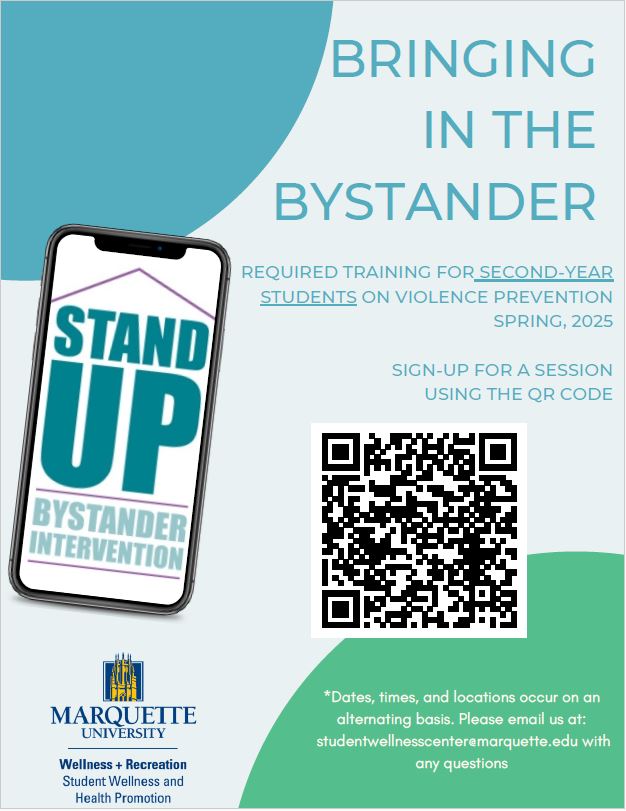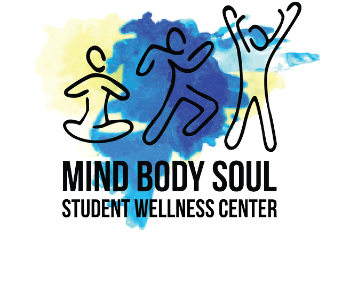Bringing in the Bystander

Bringing in the Bystander
**Emails to complete this training were sent from studentwellnesscenter@marquette.edu. This training needs to be completed in order to register for the following semester courses. If you are having trouble accessing the training, email: studentwellnesscenter@marquette.edu.

Bringing in the Bystander is an intervention program that all second-year residential students complete that teaches about sexual assault prevention, how to intervene and how to seek help. Bringing in the Bystander training sessions are offered in the Spring semester each academic year. Failure to complete this required training will result with a hold on your account, which prevents class registration.
Sexual assault affects all of us, so it’s important that we all know the facts and how to help keep our community safe. The training is four parts: 1) bystander theory and sexual misconduct, 2) consent 3) how to intervene, and 4) scenarios. The training session lasts one hour and is presented by undergraduate Peer Wellness Educators.
It is important to remember the following:
PRO-SOCIAL BYSTANDERS: are individuals whose choose to intervene in ways that impact the outcome positively.
- Sexual misconduct occurs on a spectrum. Some of these behaviors are obviously violent, like assaulting someone. Some are less obvious and less likely to be recognized as violent.
- It is easier for people to recognize violence when it is heartbreaking and horrific. These actions are always illegal and always cause great harm. It is easy for bystanders to definitively say that kind of violence is not OK.
- Lots of behaviors that perpetuate violence happen often in our community. But, it's not always easy to recognize that they lead to violence. Bystanders have a lot of power to intervene when they witness high frequency behavior. These can look like rape jokes or crude drawings. Bystanders have a less power to intervene when the frequency of behavior is lower, because it is less likely happening in front of witnesses.
What is consent?
- Consent is a knowing, voluntary and clear mutual agreement to engage in sexual activity.
- Consent is effective when it is freely and actively given and clearly communicated by words or actions.
- There must be active consent by all participants for each form of sexual activity: a clear yes; not the absence of no. Silence and passivity do not equal consent.
- Consent cannot be given by someone who is incapacitated:
- Incapacitation is a state in which a person cannot make rational, reasonable decisions because they lack the capacity to give knowing consent (e.g., to understand the “who, what, where, why or how” of their sexual interaction).
- Incapacitation can occur mentally or physically from mental disability, sleep, involuntary physical restraint, from drugs or alcohol consumption or blackout.
- Consent is possible only when there is equal power.
- Consent to sexual activity can be withdrawn at any time as long as withdrawal is clearly communicated.
- Consent cannot be given when it is the result of coercion, intimidation, force, or threat of harm.
Sign-up for your required training:
The Bringing in the Bystander sessions will be held twice a day in the evenings over the course of 9 days. You may register for sessions using the following link beginning on 1/12: Bringing in the Bystander Registration
Session are offered on the following dates and times:
- Tuesday 1/21 in AMU 163 at 5:30pm and 7:30pm
- Monday 1/27 in AMU 163 at 5:30pm and 7:30pm
- Tuesday 1/28 in AMU 163 at 5:30pm and 7:30pm
- Wednesday 1/29 in AMU 163 at 5:30pm and 7:30pm
- Sunday 2/2 in AMU 163 at 5:30pm and 7:30pm
- Monday 2/3 in AMU 157 at 5:30pm and 7:30pm
- Tuesday 2/4 in AMU 163 at 5:30pm and 7:30pm
- Sunday 2/9 in AMU 163 at 5:30pm and 7:30pm
- Monday 2/10 in AMU 163 at 5:30pm and 7:30pm





